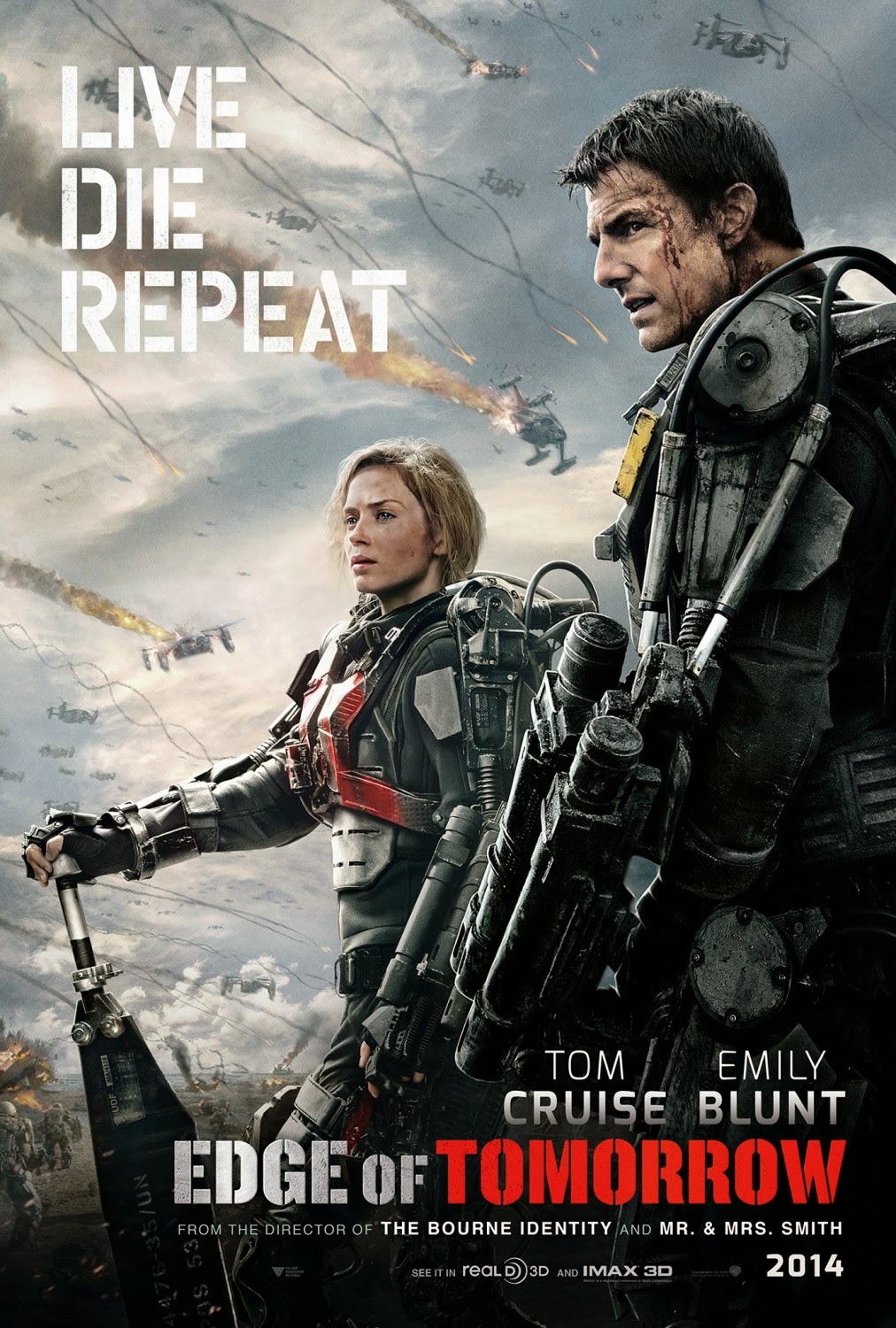In the near future Earth has been hit by a meteoroid containing an alien force that proceeds to attack the human race, taking over much of Europe. A global army is amassed and a special tool, a mechanical suit, turns the average enlistee into a super-soldier, better equipped to fight what are called Mimics - quick, multi-armed, mechanical-seeming aliens akin to the sentinels from The Matrix. Emily Blunt plays Rita, the femme fatale public face of victory for the war against the Mimics. She's a legend, known for having killed over 100 mimics in one battle - she's called the Angel of Verdun to the reverent and the Full Metal Bitch to the fearfully adoring. As the most decorated warrior of the force, and as an icon among soldiers, she holds a special authority, like the Achilles of her time.
I'll mention Groundhog Day again because much of the second act plays out similarly. You'll have a lot of fun seeing Cage attempt new tactics to advance farther in his mission. After establishing a routine to get the attention of Rita, they set to training and planning the best way to destroy the mimics. Unlike the Bill Murray comedy, though, instead of ending each day after a full 24 hours, Cage's day must end with his death (much like Source Code). This reset-by-death brings a freedom to him that only comes from the knowledge that you can try it all again tomorrow. And this is where the real magic of the situation starts to change Cage and his approach to life and those around him, especially Rita. The confidence he has in confronting those things he's already done over and over again translates into an ability to more expertly deal with the situations that result from his success at getting closer to the goal. We can see that Rita has already reached this level of existence and is glad to have someone who understands.
The real reason we love a movie like this is because we like to imagine taking on every day as if we were an expert at that day. Surely some days feel monotonously like every other day and perhaps we'd like to imagine being put in a situation where we are forced to confront life with a different attitude. Whether or not every day of your life is just the repetition of a routine, the reality is that each day truly is an opportunity to make a world of difference, and just like Phil the weatherman in Puxatawney, PA, realizes the only one trapping you in life is yourself, Cage comes to take control. In the third act the certainty of his regeneration comes into question and the lasting nature of the decisions he makes sets in, but he has a new perspective with which to make them.
The action is straightforward with no shakey-cam because the story demands you know what's happening. The editing style is quick, avoiding the need to repeat sections of the day beyond what is necessary, while rarely devolving into an extensive montage, which the film could easily do. The audience isn't always told which iteration of the day Cage is experiencing and so you're never sure if this is the first or the fifteenth time he's been in this situation until you see it play out. Both Cruise and Blunt play their characters supremely well with convincing chemistry and earnestness.
--- Spoiler Alert!!! --- If you don't want to discuss the ending don't read! ---
While the repetition of the middle section provides the fun and escalating action, the third act brings with it opportunities for some emotional reflection. Without the insurance of knowing he can always try it again, Cage, as you should know if you already watched the film, loses his power to reset. Now on his last chance to live that day, he starts the rest of his life. He comes to grips with the fact that he can't relive the day again. The thing he does keep, though, is the knowledge of the power of change he has simply by using the knowledge and skills he's gained. As he uses that, fighting along side of Rita to the very end, he now is running towards the source of the war instead of away from it as he did at the beginning of the movie. As he makes the ultimate sacrifice at the film's climax, and only after he has given his life, knowing full well he can't have it back, it is given to him again. As he goes to find Rita in the final moments of the film, and as he stares at her and laughs right before the credits roll, he's finally able to envision a future that includes her and now he has the freedom of perspective that enables him to envision a radical reality and to choose to make that happen.

No comments:
Post a Comment